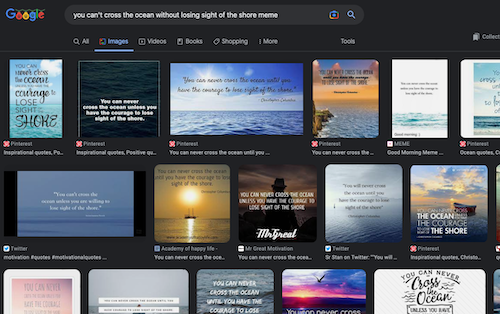Loyalty to yourself isn’t as simple as it sounds
My writer friend Rachel was telling me about how she had this idea for a new novel.
“But it’s not young-adult,” she said. “I’ve always written young-adult fiction.”
She probably expected me to ask her what genre this new story was (adult literary), and to get into a discussion of genre-hopping, marketability, and personal branding.
Instead, I asked, “Well, do you feel more loyal to your past self or to your future self?”
She thought a few seconds, then replied, “I feel most loyal to my readers.”
“So,” I concluded, “your greatest loyalty is to somebody else’s made-up version of you.”
The courage to change… or the courage to stay the same
With writers, the genre-hopping question is not uncommon. At its core, it’s not unlike thinking about a career change, or going back to school, or moving across the country for a new relationship.
They’re all some version of changing a piece of your identity.
People use lots of different metaphors for letting go of the past in order to move on to a new future.
For example: You can’t cross the ocean without having the courage to lose sight of the shore.
Quotes like that can inspire and motivate, especially when turned into memes.

But quotes like that can also trick people into making the wrong decisions for the wrong reasons.
For example, that quote about the ocean and the shore defines courage in a very limited way.
Sometimes courage means ditching your past. Sometimes it means doubling down on your past. And sometimes it means redefining how you view both your past and your future.
The powerful gravity of the past
My friend Rachel said she was most loyal to her readers. That sounds good, noble, and very brand-aware, doesn’t it?
And maybe it is. But maybe it’s just Rachel capitulating to the overwhelming gravity created by other people’s expectation that she is, and always will be, a young-adult author.
Every day we choose how we show up in the world. And each of those choices, whether we intend it or not, teaches everyone around us who we are.
Rachel, like me, wrote young-adult fiction. The people who read those books now think of her as a young-adult author. When they see she has a new book out, they’ll expect it to be similar to what she’s written before.
Some of those people will be selfishly disappointed if it’s different from what they expect. Some will be angry; some will take it personally: How dare she change my experience? I don’t like her anymore.
Others will simply be skeptical: She wrote some good young-adult novels, but adult literary fiction is so different. She should stick to what she knows. People won’t like it.
The irony of success is that the more successful you get at something, the harder it can be to change… specifically because of the overwhelming grip that history has on your identity.
It becomes far harder to lose sight of the shore when everyone else keeps dragging you back to land.
The terrifying commitment of future plans
The other limiting fear people face is the vulnerability that comes with saying a new dream out loud. If you’re planing a big change, you’ll have to tell people about it at some point.
While the skeptics will keep pulling you back to shore, your champions will push you relentlessly to make it across that ocean.
Think about the last time you confided your most audacious dream to someone. How vulnerable did you feel, saying it out loud for the first time?
Even when someone is your biggest champion—possibly because they are your biggest champion—talking to them about a new idea can move it from “maybe someday I’ll try this” to “now I’m expected to do this.”

Suddenly that idea you had becomes a commitment, and you start to feel like you have to cross that ocean. That once you start, you can’t ever turn back, for any reason.
So to avoid getting pushed forward before you’re ready, maybe it’s best to keep your ideas to yourself, until you’re really 100% certain without any shred of doubt that it’s the absolute right, objectively best decision.
It’s just easier to let everyone else decide, isn’t it?
So here you are, trying to decide if you should make this big change.
Skeptics won’t think you can succeed. Selfish people will expect you to always stay exactly as they remember you. Your biggest fans will pressure you to move forward, even if it turns out wrong.
It’s a lot easier just to avoid all the complexity and work, isn’t it?
It’s a lot easier to ignore what you want and who you are, and give over your decision-making to other people. It’s a lot easier to say “I’m most loyal to my readers.”
In this light, however, “I’m most loyal to my readers” is no longer as good, noble, and brand-aware as it first seemed on the surface.
When you’re most loyal to someone else’s version of you, you aren’t being loyal to yourself.
Who were you, who are you, and who do you want to be?
I talk a lot with my clients about intrinsic values (who you are) in conflict with external pressures (who others tell you to be).
Much of the time, external pressures are in alignment with who we are at our core. When this happens, we feel like we belong and that we can live authentically.
Contemplating any kind of major change, however, brings to the surface all the conflicts between your intrinsic values (who you want to become), and external pressures (who others tell you to be).
These conflicts can manifest in many ways, and getting past them to the right decision can prove to be difficult, confusing, and painful.
I have a number of techniques and exercises to help my clients move through this process. The goal isn’t to identify the decision that everyone will agree is objectively best. Such a thing rarely exists.
The goal of this process is to clarify the inputs, articulate the critical decision points, and highlight the red herrings in order to ultimately come to the right decision.
One of those techniques that has helped several of my clients clarify things is a simple question:
Are you most loyal to your past self, to your future self, or to some fictitious self defined by others?
None of those is always the correct one, and none is always the wrong one.
The right answer depends on all the same factors that go into the decision whether to change or not. It’s really not much more than a rephrasing of the original question.
“Should I write this new novel that’s in a new genre?”
Reframed:
“Should I stick to what I know I’m good at, should I change to this new thing I’m excited about trying, or should I honor the expectations others have of me?”
Sometimes a simple reframing of the question in this way will make the answer unavoidably obvious. Not always, but in a lot of cases.
When you’re in touch with your core values and understand the external pressures influencing you, you can thoughtfully weigh each of these with intentionality and clarity. And that leads to the best decision-making.
What Rachel decided to do
In Rachel’s case, she had more options than “should I or shouldn’t I.” I asked if she could work on more than one project at a time. This would allow her to be loyal to her readers (keep producing what they expect) while trying her hand at the new genre.
Even though in retrospect this seems an absurdly obvious solution, Rachel had been so wrapped up in the should/shouldn’t question, that she hadn’t been able to see that other options might exist for her.
Side note on being a parent
If you’ve been reading my posts for a while, you know that my oldest child identifies as transgender.
I’ve been praised for being very open-minded and supportive. I’ve also been told that I should not be as supportive of her as I am. I’ve talked with other parents of gender-expansive kids who struggle to work through their own feelings, and how much parental authority they need to wield in guiding their kid into adulthood.
For my own part, I’m trying to exert as little external influence on my child as possible because ultimately, her life is not about me. It’s about her.
A lot of people forget that while we’re working through our own changes and trying to figure out how to be authentically ourselves amid all the external pressures influencing us, we are also agents of external influence on others.
Perhaps that’s a subject for a future blog post, though.

What changes are you thinking about?
This morning I had breakfast with another friend who is at a phase in life where a change might be expected. She was describing her thought process to me, and how she felt that an aspect of her identity for the past 20 years was reaching a feeling of fulfillment, and as she looked forward to the next 20 years, she could feel a new identity taking shape.
I had already written most of this blog post before we met, so it was one of those “I’m getting chills” moments for both of us when I shared the loyalty to past self versus future self question. Then we laughed at how she had answered my question before I’d asked it.
I work with a lot of people contemplating a big change, or who are working through a big change that has been thrust upon them. Change is a certainty of life, and a lot of happiness comes from how we navigate change.
What kinds of changes are you thinking about, or working through? What are you most excited about for your future? What dreams are simmering that you haven’t yet shared with even your close friends?
I’d love to hear about it, and, if you want a sounding board, help you get on the most right path forward for you. Drop me a line and we’ll talk.



2 Comments
3 easy actions to clarify your career path · June 6, 2023 at 9:14 pm
[…] While that’s a terrible question to ask yourself (you are already mired in ambivalence, so all you’re really doing is creating guilt and shame by not being able to answer it), it’s an even worse question to ask someone else… because they will probably give you an answer. […]
Win a signed copy of my new book - Gray Bear Coaching LLC · April 8, 2024 at 8:52 pm
[…] those people I say: I’m trying to be loyal to myself. I hope you are able to update the imagined version of me you’ve created in your mind. My guess […]